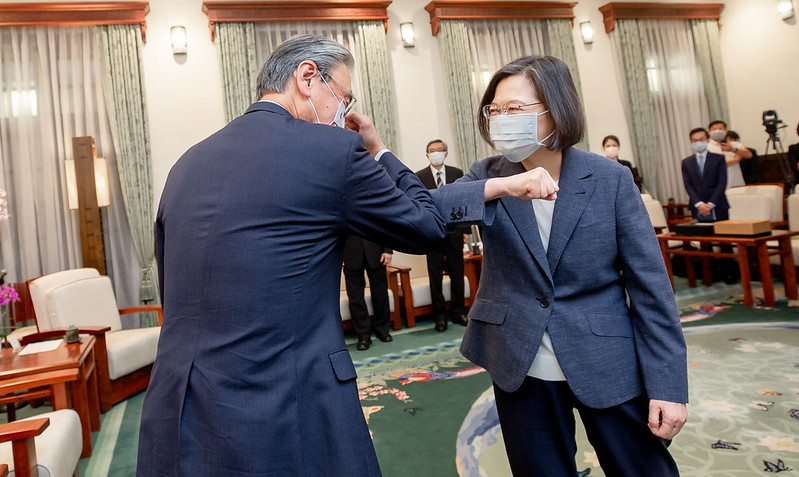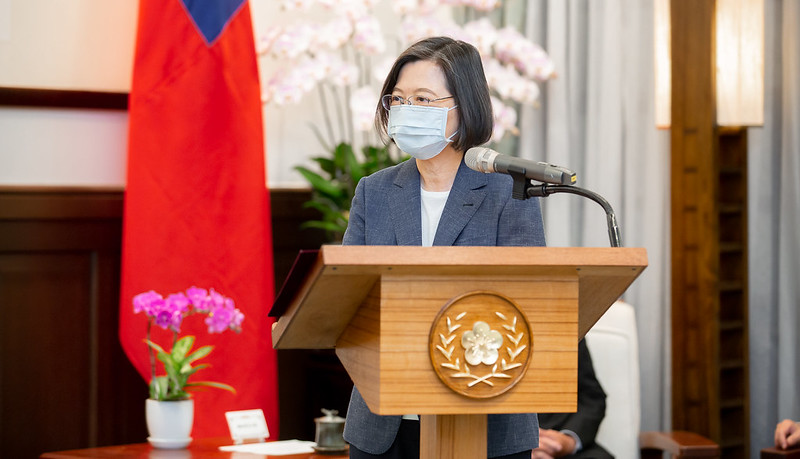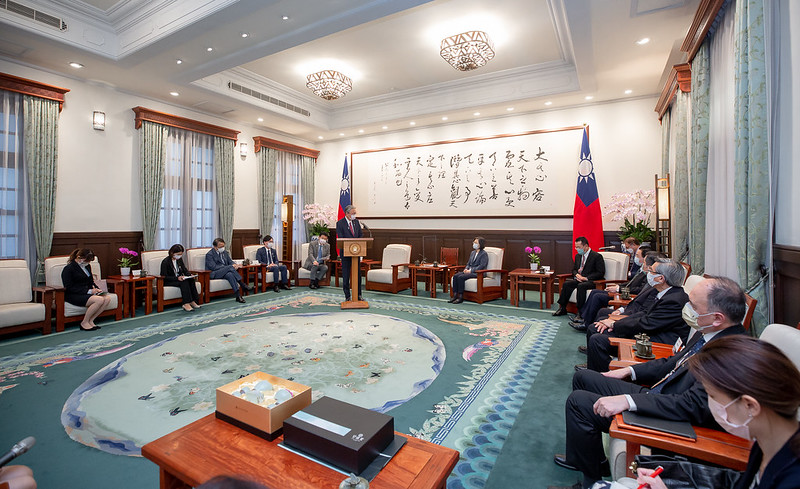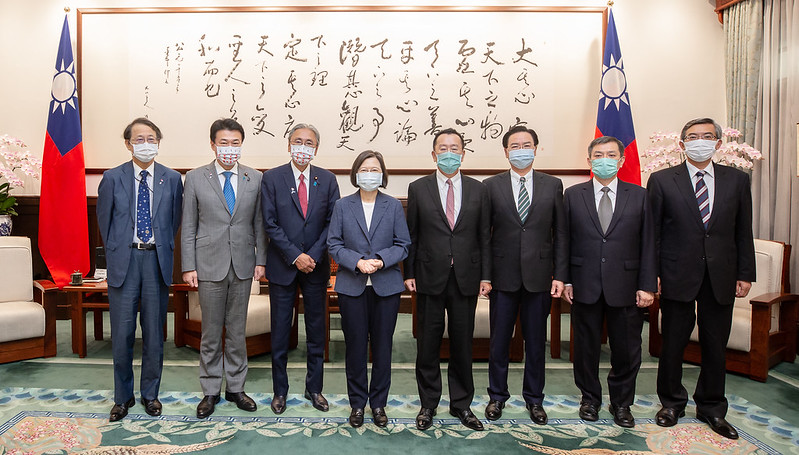News & activities
 News releases
News releases
On the morning of August 23, President Tsai Ing-wen met with a delegation led by Japanese House of Representatives Member and Japan-ROC Diet Members' Consultative Council Chairman Furuya Keiji. In remarks, President Tsai noted that Taiwan and Japan share a commitment to the values of democracy and freedom, enjoy a partnership of critical importance to security, and should continue deepening cooperation to ensure regional peace, stability, freedom, and prosperity. The president also expressed hope that Taiwan and Japan will continue to strengthen cooperation while upholding regional peace and stability, becoming steadfast regional partners and driving freedom and prosperity around the globe.
A translation of President Tsai's remarks follows:
It's a great pleasure to welcome Chairman Furuya Keiji of the Japan-ROC Diet Members' Consultative Council for once again leading a delegation to Taiwan. I am very happy to see old friends. The council is an important bridge for Taiwan-Japan relations. Since taking office as president, I've met quite a few times here at the Presidential Office with Chairman Furuya and other good friends from the council. This visit by Chairman Furuya demonstrates support for Taiwan in Japan's National Diet. On behalf of the people of Taiwan, I want to express our sincere gratitude.
We deeply miss our dear friend, former Prime Minister Abe Shinzo, who long served as an advisor to the council. This past March, thanks to arrangements by the council, I spoke via videoconference with former Prime Minister Abe, who then reiterated that if Taiwan has a problem, then Japan has a problem, and the Japan-US alliance also has a problem. I would like to take this opportunity to once again thank former Prime Minister Abe for all he contributed to Taiwan-Japan relations and the international democratic community.
Russia's invasion of Ukraine earlier this year and, more recently, China's frequent military exercises in the Taiwan Strait all threaten the stability of the entire Indo-Pacific region. The international community must work together to respond to authoritarian expansion and provocation. An invasion of Taiwan would have a huge impact on democratic values and the overall Indo-Pacific region. Taiwan and Japan share a commitment to the values of democracy and freedom, and our partnership is of critical importance to security. We should continue deepening our cooperation to ensure regional peace, stability, freedom, and prosperity.
I am confident that, with the help of the council, the partnership between Taiwan and Japan will only grow stronger. Members of the council come from across different political parties in Japan, and include over 260 members of Japan's National Diet, giving the council great influence.
Last year, for example, with the support of Chairman Furuya and the council, Japan's House of Councillors unanimously passed a resolution in support of Taiwan's participation in the World Health Assembly (WHA). On the day of the vote, the councillors present all stood to show their approval of the resolution, a scene which deeply moved us.
In the past few years, Taiwan and Japan have established a close partnership, proving that "a friend in need is a friend indeed." When one of us encounters trouble, the other lends a helping hand. Taiwan provided Japan with assistance after the Great East Japan Earthquake of 2011. And when Taiwan faced a shortage of COVID-19 vaccines, Japan promptly provided Taiwan with doses.
In hard times, Taiwan and Japan work together, deepening the friendship that brings us to each other's aid. Amid challenges, our commitment to shared values has grown stronger. In the future, we will face more and more shared challenges. I hope that Taiwan and Japan will continue to strengthen cooperation while upholding regional peace and stability, becoming steadfast regional partners and driving freedom and prosperity around the globe.
In closing, let me once again thank Chairman Furuya and our other distinguished guests for showing their utmost support for Taiwan with concrete action. Thank you, and I wish our visitors a smooth and successful trip.
In his own remarks, Chairman Furuya said he was delighted to once again represent the Japan-ROC Diet Members' Consultative Council in meeting with President Tsai, and expressed his sincere gratitude for President Tsai's condolences on the passing of former Prime Minister Abe, both during her recent visit to the Japan-Taiwan Exchange Association and in her remarks just earlier. Chairman Furuya also mentioned that the memorial message for former Prime Minister Abe that earlier lit up Taipei 101 gave many Japanese a deep sense of the profound trust and friendship between Taiwan and Japan.
Pointing out that the Indo-Pacific has become a free and prosperous ocean, Chairman Furuya noted that it was former Prime Minister Abe who, at the Tokyo International Conference on African Development (TICAD) in August 2016, first proposed to the world the idea of a "Free and Open Indo-Pacific Strategy." The chairman stated that peace and stability in the Taiwan Strait is therefore not only crucial to ensuring Japan's security, but is also an extremely important foundation for security and stability across the international community.
Chairman Furuya further noted that Russia's invasion of Ukraine is no different from China using the recent visit by US House Speaker [Nancy Pelosi] to Taiwan as a pretext to fire missiles into Japan's exclusive economic zone, and stated that these military threats are absolutely unacceptable to the people of Taiwan and Japan, who share the values of freedom, democracy, the rule of law, and respect for human rights. He also offered praise and respect to President Tsai for responding calmly to China's provocations.
Making reference to President Tsai's August 5 statement on Twitter, in which she indicated that Taiwan will not escalate tensions across the Taiwan Strait, Chairman Furuya expressed his belief that close cooperation across the international community, led by Japan and the United States, must work to thwart attempts by China to change the status quo.
Chairman Furuya expressed his sense that the global strategic landscape has already begun to change, citing the Quadrilateral Security Dialogue (Quad) formed by the US, Japan, India, and Australia as the most representative regional security mechanism. Noting that countries in Europe, especially the United Kingdom and France, have also expressed great concern, Chairman Furuya said he believes that these like-minded countries can work together on the principles of freedom and openness to strengthen mutual cooperation.
Chairman Furuya mentioned that a few years ago, when the Pacific island nations of Kiribati and Solomon Islands severed diplomatic relations with Taiwan to establish ties with China, they may have chosen to do so for the sake of short-term economic gains. He said that China, acting purely in its own interests, has provided excess credit under the banner of assistance to these countries, which end up falling into China's trap. The chairman stated that Japan will emphatically warn Pacific island nations not to be deceived.
Chairman Furuya pointed out that Pacific Islands Leaders Meeting (PALM), hosted by the government of Japan every three years, has now been held nine times and has included efforts to assist Pacific island nations in cultivating talent, with the aim of providing assistance that is relevant from the standpoints of the island nations themselves. He added that at the next PALM meeting, Japan intends to provide substantive assistance to Pacific island nations on economic and security issues, linking together the prosperity of local residents.
"Once clear ocean waters have been polluted, it is difficult to restore them to their original state," said Chairman Furuya, noting that Japan will stand on the side of these Pacific island nations and continue to provide them with assistance. He also expressed confidence that Taiwan and Japan can remain true to this principle in our cooperation and help keep our ocean clear, and called this the true meaning behind Prime Minister Abe's words, "If Taiwan has a problem, then Japan has a problem, and the Japan-US alliance also has a problem."
Chairman Furuya noted that over the past few years, Taiwan provided face masks to Japan, and Japan provided Taiwan with COVID-19 vaccines, the most concrete signs that "a friend in need is a friend indeed." The chairman concluded his remarks by saying that, in the future, all the members of the Japan-ROC Diet Members' Consultative Council will do everything in their power to advance Taiwan-Japan ties and make them even stronger.
Also present at the meeting were Japanese House of Representatives Member Kihara Minoru, who serves as secretary general of the council, and Chief Representative Izumi Hiroyasu of the Japan-Taiwan Exchange Association Taipei Office.












